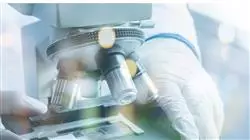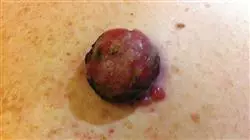University certificate
The world's largest faculty of medicine”
Introduction to the Program
This training will generate a sense of security in the performance of medical practice, which will help you grow personally and professionally”

Access to Big Data platforms, which have a large amount of analytical and clinical data pertaining to the population affected by cancer, allows oncology professionals to gain a closer understanding of the disease, as well as more exhaustive and accurate diagnosis of the patient. This great technological revolution in oncological medicine represents a great opportunity in cancer research and treatment, thanks to the fact that physicians have access to a large amount of data and analysis worldwide.
Professionals in the oncology field need to constantly update their knowledge related to cancer treatments in order to be able to offer patients the most suitable treatment based on their real needs.
This Postgraduate diploma in oncological diagnostics. Technological advances and Big Data allow us to gain in-depth knowledge about the effective techniques and resources being used for oncological diagnosis. These include cytology and radiology.
Cytology diagnosis has evolved a lot in recent times, making it possible to perform immunohistochemical staining (immunocytochemistry), mutations or other specific genomic alterations, and also to determine the status of biomarkers essential in cancer management. Radiology, for its part, remains the essential tool for diagnosing more than 85% of oncological diseases.
The program has been designed and developed by oncology specialists ranked among the best in medical excellence, who have provided students with the most advanced knowledge, experience and practical cases to create a program following the highest quality criteria available on the market.
Update your knowledge with the Postgraduate diploma in Oncological Diagnosis program. Technological Advances and Big Data”
This Postgraduate diploma in Oncologic Diagnosis. Technological Advances and Big Data contains the most complete and up-to-date scientific program on the market. The most important features of the program include:
- Development of more than 75 case studies presented by experts in oncological diagnostics. Technological Advances and Big Data
- The graphic, schematic, and eminently practical contents with which they are created provide scientific and practical information on the disciplines that are essential for professional practice
- New developments in oncologic diagnosis. Technological Advances and Big Data
- It contains practical exercises where the self-evaluation process can be carried out to improve learning
- With special emphasis on innovative methodologies in oncological diagnosis. Technological Advances and Big Data
- All of this will be complemented by theoretical lessons, questions to the expert, debate forums on controversial topics, and individual reflection assignments
- Content that is accessible from any fixed or portable device with an Internet connection
This Postgraduate diploma may be the best investment you can make in selecting a refresher program for two reasons: in addition to updating your knowledge in Oncologic Diagnosis. Technological Advances and Big Data, you will obtain a Postgraduate diploma issued by TECH Global University"
Its teaching staff includes professionals belonging to the field of oncological diagnosis. Technological advances and Big Data, who bring to this training the experience of their work, as well as recognized specialists belonging to reference societies and prestigious universities.
The multimedia content developed with the latest educational technology will provide the professional with situated and contextual learning, i.e., a simulated environment that will provide immersive training program to train in real situations.
This program is designed around Problem Based Learning, whereby the professional must try to solve the different professional practice situations that arise during the course. For this purpose, the professional will be assisted by an innovative interactive video system created by renowned experts in the field of oncological diagnosis. Technological advances and Big Data. and with great medical expertise.
Enhance your professional performance and improve your patients' quality of life"

Take the opportunity to learn about the latest advances in Oncological Diagnostics. Technological Advances and Big Data and improve the health of your patients"
Syllabus
The contents structure has been designed by a team of the best professionals in the field of pathological anatomic anatomical pathology with a long history and recognized prestige in the profession, backed by the volume of cases reviewed, studied and diagnosed, and with extensive knowledge of new technologies applied to anatomopathological diagnosis.

It includes clinical cases to bring the development of the program as close as possible to the reality of medical practice"
Module 1. Cancer General Aspects. Risk factors
1.1. Introduction
1.2. Overview of Malignant Neoplasms
1.2.1. Nomenclature
1.2.2. Features
1.2.3. How Metastases Spread
1.2.4. Prognostic Factors
1.3. Epidemiology of Cancer
1.3.1. Incidence
1.3.2. Prevalence
1.3.3. Geographical Distribution
1.3.4. Risk Factors
1.3.5. Prevention
1.3.6. Early Diagnosis
1.4. Mutagenic Agents
1.4.1. Environmental
1.4.2. Workplace
1.4.3. Toxic Substances in Food
1.5. Biological Agents and Cancer
1.5.1. RNA Virus
1.5.2. DNA Virus
1.5.3. H. pylori
1.6. Genetic Predisposition
1.6.1. Genes Linked to Cancer
1.6.2. Susceptibility Genes
1.6.2.1. Breast Tumors
1.6.2.2. Lung Tumors
1.6.2.3. Thyroid Tumors
1.6.2.4. Colon Tumors
1.6.2.5. Skin Tumors
1.6.2.6. Bone Tumors
1.6.2.7. Pancreas Tumors
1.6.2.8. Neuroblastoma
1.7. Clinical Aspects of Malignant Neoplasms
1.7.1. Introduction
1.8. Neoplastic Disease Staging
1.8.1. Update
Module 2. Biological Basis of Cancer
2.1. Introduction to the Molecular Basis of Cancer
2.2. Genes and the Genome
2.2.1. The Main Cell Signaling Pathways
2.2.2. Cell Growth and Proliferation
2.2.3. Cell Death. Necrosis and Apoptosis
2.3. Mutations
2.3.1. Types of Mutations. Frameshift; Indels, Translocations, SNV; Missense, Nonsense, CNV, Driver vs. Passenger
2.3.2. Mutagens
2.3.2.1. Biological Agents and Cancer
2.3.3. Mutation Repair Mechanisms
2.3.4. Mutations with Pathological and Non-Pathological Variants
2.4. Major Advances in Precision Medicine
2.4.1. Tumor Biomarkers
2.4.2. Oncogenes and Tumor Suppressor Genes
2.4.3. Diagnostic Biomarkers
2.4.3.1. Resistance
2.4.3.2. Prognosis
2.4.3.3. Pharmaco-Genomics
2.4.4. Cancer Epigenetics
2.5. Main Techniques in the Molecular Biology of Cancer
2.5.1. Cytogenetics and FISH (Fluorescence In Situ Hybridization)
2.5.2. DNA Extract Quality
2.5.3. Liquid Biopsy
2.5.4. PCR as a Basic Molecular Tool
2.5.5. Sequencing, NGS
Module 3. Cytological Diagnosis of ES Malignant Lesions
3.1. Introduction to Cytopathology (ART and SCIENCE)
3.1.1. Historical Perspective
3.1.2. Practical Concepts
3.1.2.1. Management
3.1.2.2. Staining
3.1.3. Basic Concepts Cytomorphology
3.2. Exfoliative Cytology
3.2.1. Gynecologic Cytology - Bethesda System
3.2.2. Urine Cytology - Paris System
3.2.3. Bodily Fluids Cytology
3.3. SUPERFICIAL Fine Needle Aspiration Puncture
3.3.1. Introduction
3.3.1.1. Practical Aspects
3.3.2. Thyroid and Salivary Gland FNA
3.3.3. Breast FNA
3.3.4. Soft Tissue and Bone FNA
3.4. DEEP Fine Needle Aspiration Puncture
3.4.1. Introduction - ROSE (Rapid on site evaluation)
3.4.1.1. Lung and Mediastinal FNA
3.4.1.2. Pancreas FNA
3.4.1.3. Lymph Node FNA
3.5. Differential Diagnosis in Cytopathology
3.5.1. Main Cytomorphological Patterns
3.5.2. Immunocytohistochemistry
3.5.3. Molecular Cytopathology
3.6. The Role of Cytopathologists in the Treatment of Cancer
3.6.1. Study of Biomarkers in Cytological Samples
3.6.2. Immunotherapy and the Role of Cytopathology
3.6.3. Challenges and New Perspectives

A unique, key, and decisive Training experience to boost your professional development”
Postgraduate Diploma in Oncological Diagnosis. Technological Advances and Big Data
In a constantly evolving world, the field of oncology diagnostics requires highly trained professionals who are aware of technological advances and the latest trends in data analysis. At TECH Global University, we present our Postgraduate Diploma program in Oncology Diagnostics: Technological Advances and Big Data, designed to provide you with the skills and knowledge you need to excel in this ever-changing field. Our program is delivered through online classes, allowing you to access quality education from anywhere, anytime. Through our online learning platform, you'll have access to interactive resources, live lectures and up-to-date study materials to keep you up to date with the latest innovations in oncology diagnostics.
Boost your career in the field of oncology diagnostics with TECH Global University.
In the Oncology Diagnostics Postgraduate Diploma, you'll explore the latest technological advances, such as molecular imaging and next-generation genetic sequencing techniques, that are revolutionizing cancer diagnosis and treatment. In addition, you will acquire skills in big data analysis, enabling you to interpret and leverage the vast amount of clinical information to improve diagnostic accuracy and efficiency. Our program is designed and guided by experts in the field of oncology diagnostics, who will provide you with quality education and guide you in your professional development. In addition, you will have the opportunity to collaborate with other healthcare professionals, share knowledge and experiences, and make valuable industry connections. Upon completion of the program, you will receive a certificate from TECH Global University that will support your knowledge and skills in advanced oncology diagnostics. This certificate will open doors in hospitals, research centers and health-related companies, where you can apply your skills to contribute to the early detection and effective treatment of cancer. Boost your career in the field of oncology diagnostics and be part of the technological revolution in medicine. Join TECH Global University's Postgraduate Diploma in Oncology Diagnostics: Technological Advances and Big Data and make a difference in the fight against cancer.







